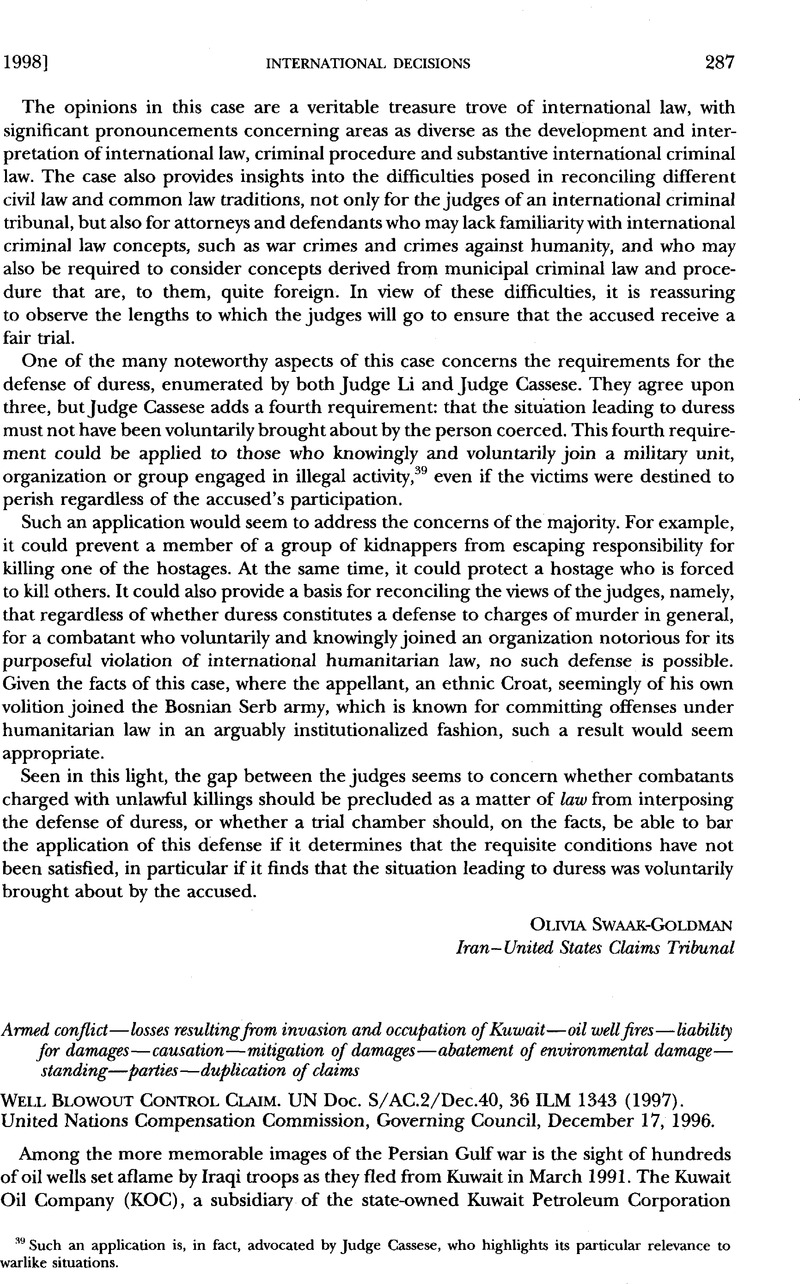Published online by Cambridge University Press: 27 February 2017

1 KOC claims for lost revenues and the cost of rebuilding the oil wells and resuming production are the subject of related proceedings and were not addressed in this decision.
2 For the text of the executive summary of the Report and Recommendation of the Panel of Commissioners, see UN Doc. S/AC.26/1996/5. For the full text of the Report and Recommendation of the Panel of Commissioners, see UN Doc. S/AC.26/1996/5/Annex, 36 ILM 1343 (1997) [hereinafter Decision]. Citations to the panel’s decision refer to the full text of the report.
3 SC Res. 687 (Apr. 8, 1991), 30 ILM 847 (1991), para. 16.
4 UN Doc. S/AC.26/1991/7/Rev.1, para. 35 (1992) [hereinafter Decision 7]. Governing Council Decision 7 determined that with respect to government claims, payments are available for “losses or expenses resulting from . . . [a]batement and prevention of environmental damage, including expenses directly relating to fighting oil fires”—precisely the type of loss for which KOC was seeking damages. But here the panel faced the issue of KOC’s submission as a corporate claim. The panel concluded, inter alia, that the Governing Council could not have intended to deny subject matter jurisdiction to a claim clearly cognizable under Resolution 687, and that in any event other provisions of Governing Council Decision 7 render KOC’s corporate claim compensable as a loss suffered as a result of “[a]ctions by officials, employees or agents of the Government of Iraq or its controlled entities.” Decision, 36 ILM at 1351–52, paras. 51–54.
5 Decision, 36 ILM at 1356, para. 87.
6 Id. at 1352–53, paras. 57, 60.
7 Id. at 1353, para. 61.
8 UNCITRAL Arbitration Rules, Art. 32(2), reprinted in 15 ILM 701 (1976) (emphasis added).
9 Decision 7, supra note 4, para. 39 (“Any compensation, whether in funds or in kind, already received from any source will be deducted from the total amount of losses suffered.”).
10 Decision, 36 ILM at 1356, para. 82.
11 Id. at 1354–55, paras. 73–79.
12 Id. at 1356, paras. 85–86.
13 See War-Risk Insurance Premium Claims, 7 R.I.A.A. 44, 62–63 (1923) (“The distinction sought to be made between damages which are direct and those which are indirect is frequently illusory and fanciful and should have no place in international law.”) (citing Alabama Claims, reprinted in 1 John, Bassett Moore, International Arbitrations 646 (1898)Google Scholar).
14 Indeed, some of the losses considered to be “direct” and therefore eligible for compensation by the UNCC—such as losses arising from the breakdown of civil order in Kuwait or Iraq—have been considered to be “indirect” in the past. See Decision 7, supra note 4, para. 21; Boxer Indemnities Claims Commission, reprinted in 3 Marjorie, M. Whiteman, Damages in International Law 1781 (1943)Google Scholar. On the other hand, some of the losses considered to be “indirect” and therefore ineligible for compensation by the UNCC—such as losses suffered as a result of the trade embargo and related measures—have been considered to be “direct” in the past. See Report and Recommendation Made by the Panel of Commissioners Concerning the Egyptian Workers’ Claims (Jurisdictional Phase), UN Doc. S/AC.26/1995/R.20/Rev.1, at 77.
15 War-Risk Insurance Premium Claims, 7 R.I.A.A. at 55.
16 Id. at 63.
17 See Decision, 36 ILM at 1356, para. 86 (in accordance with general principles of international law, Iraq’s liability includes any direct loss, damage or injury suffered as a result of military operations or threat of military action by either side); see also Decision 7, supra note 4, para. 21 (holding Iraq liable for conduct of other parties, such as “[m]ilitary operations or threat of military action by either side”) (emphasis added)).
18 For the passage in question, see text at note 3 supra.
19 UN Doc. S/AC.26/1992/15, para. 3 (emphasis added) [hereinafter Decision 15].
20 Decision, 36 ILM at 1352, para. 54. This conclusion comports with earlier Governing Council decisions that have concluded that “[t]he duty to mitigate damages applies to all claims.” See Decision 15, supra note 19, para. 9.
21 It is a general principle of international law that “[t]he aggrieved party is entitled to recover any expenses reasonably incurred in attempting to reduce the harm “See International Institute for the Unification of Private Law, Principles of International Commercial Contracts, Art. 7.4.8 (1994) [hereinafter Unidroit Principles]; see also FMC Corp. v. Ministry of National Defence, AWD 292–353–2, 14 Iran-U.S. C1. Trib. Rep. 111, 124 (1987).
22 UNIDROIT Principles, supra note 21, Art. 7.4.8, cmt. 2.
23 Decision, 36 ILM at 1349, para. 34.
24 Id.
25 Id. at 1365, para. 149.
26 Id. at 1361, para. 117 (emphasis added).
27 A significant portion of KOC’s claim, approximately $337 million, was deferred for resolution by subsequent panels. Those claims, however, were not rejected on the grounds that they were unreasonable or unverifiable. Rather, verification of those claims was to be made by subsequent panels charged with resolving KOC’s other claims. See, e.g., id. at 1363–64, 1376, paras. 137, 233.
28 Yeager v. Islamic Republic of Iran, AWD 324–10199–1, 17 Iran-U.S. C1. Trib. Rep. 92, 108 (1987) (claimant forcibly expelled from Iran by military authorities under no obligation to mitigate damages by selling or shipping personal effects).